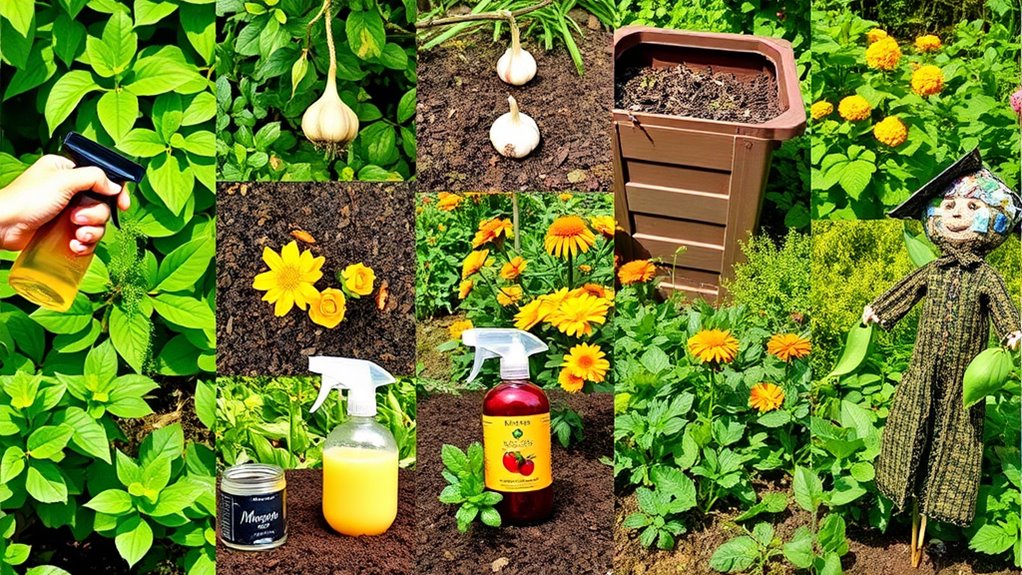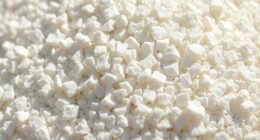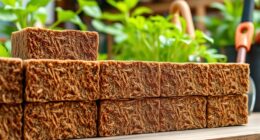To effectively control pests naturally, incorporate beneficial insects like ladybugs and lacewings, plant companions such as marigolds and basil, and use organic repellents like neem oil, garlic spray, or hot pepper solutions. Physical barriers like row covers and regular garden hygiene help prevent infestations. Combining these methods with integrated pest management creates a resilient, chemical-free system. Keep exploring these strategies to help your garden stay healthy and pest-free without chemicals.
Key Takeaways
- Use beneficial insects like ladybugs and lacewings to naturally reduce pest populations.
- Apply organic repellents such as neem oil, garlic, or hot pepper sprays to deter pests.
- Implement companion planting with pest-repellent plants like basil and marigolds to protect crops.
- Install physical barriers like row covers and maintain garden hygiene to prevent pest access.
- Adopt integrated pest management combining biological, organic, and cultural methods for sustainable control.

Organic pest control methods offer a safe and eco-friendly way to protect your garden from unwanted insects and pests. Instead of relying on harsh chemicals, you can harness nature’s own defenders—beneficial insects—to keep pest populations in check. Ladybugs, lacewings, and predatory beetles are some of the most effective allies in your garden. These beneficial insects naturally prey on common pests like aphids, spider mites, and whiteflies. By attracting or releasing them into your garden, you create a balanced ecosystem where pests are kept under control without harming your plants or the environment. To encourage these helpful bugs, plant a diverse range of flowers and herbs such as dill, fennel, and marigolds that serve as nectar sources. Avoid using broad-spectrum insecticides, which can wipe out beneficial insects along with pests, disrupting your garden’s natural balance.
Organic repellents are another essential tool in your pest management arsenal. These plant-based solutions work by deterring pests without the risks associated with synthetic chemicals. For example, neem oil, derived from the neem tree, acts as an organic repellent and disrupts pest feeding and breeding. Similarly, garlic and hot pepper sprays can create a scent barrier that pests find unappealing, preventing them from settling on your plants. These repellents are easy to prepare at home—blend garlic, hot peppers, and a bit of soap with water, then spray on your plants. Consistency is key; reapply after rain or watering to maintain their effectiveness. Besides repellents, companion planting is another proven method. Planting basil near tomatoes or marigolds amid vegetable beds can naturally repel pests and attract beneficial insects, creating a mutually beneficial environment.
You should also consider physical barriers like row covers and insect screens to physically block pests from reaching your plants. These are simple yet effective methods that don’t involve any chemicals. Regularly inspecting your plants helps you catch pest issues early, allowing you to take targeted action before infestations become severe. Keeping your garden healthy overall—by providing adequate water, nutrients, and proper spacing—also makes plants more resistant to pests. When you combine these organic methods—attracting beneficial insects, using organic repellents, implementing physical barriers, and practicing good garden hygiene—you create a sustainable system that naturally keeps pests at bay. This approach not only protects your plants but also supports local ecosystems, promoting a vibrant and resilient garden where pests and beneficial insects coexist harmoniously. Additionally, understanding the importance of beneficial insects can help you make informed decisions in your pest management strategies.
Frequently Asked Questions
Are Organic Pest Control Methods Safe for Pets and Children?
You’re wondering if organic pest control methods are safe for pets and children. Generally, these methods prioritize pet safety and children protection, making them a safer choice than chemical options. They often use natural ingredients like neem oil or insecticidal soaps, which are less toxic. However, always read labels carefully, follow application instructions, and keep pets and kids away during treatment to guarantee maximum safety and peace of mind.
How Long Does It Take to See Results Using Organic Pest Controls?
Think of your pest issue as a garden needing patience; it takes time to see results. Usually, you’ll notice visible improvements within a few days to a couple of weeks, depending on the pests and treatment. Timing expectations vary, but organic methods work steadily like the seasons changing. Stay consistent, and you’ll find that with patience, your garden will flourish free of pests, revealing a healthier, more balanced environment.
Can Organic Methods Eliminate All Types of Pests Effectively?
You might wonder if organic methods can fully eliminate all pests. While they’re effective against many, some pests develop resistance, unlike synthetic pesticides. Organic controls work best when integrated into a thorough plan, targeting pests naturally. You’ll see good results with consistent use, but for severe infestations, combining organic methods with other eco-friendly strategies boosts your chances of successful pest elimination.
Do Organic Pest Control Techniques Require Professional Expertise?
Think of organic pest control like tending a garden—you can do it yourself or call in the pros. You don’t always need professional services; many DIY tips are simple and effective. With basic knowledge, you can handle common pests without specialized skills. However, for severe infestations, consulting a professional might be best. Overall, organic methods can be manageable, and you can choose to learn or rely on expert help when necessary.
Are Organic Pest Control Solutions Cost-Effective Compared to Chemical Options?
When comparing costs, organic pest control solutions can be more budget-friendly over time, especially since they often require fewer applications and less maintenance. You should consider your budget considerations, as organic methods might have a higher upfront cost but save money in the long run. The cost comparison shows that investing in organic options can be a smart choice for effective, sustainable pest management without the expense of chemical treatments.
Conclusion
By trying these organic pest control methods, you might find that nature often has the perfect solution right in your own backyard. It’s almost like the pests and the helpers are destined to cross paths, guiding you toward healthier plants and a more balanced garden. When you embrace these natural techniques, you’ll notice how seamlessly they fit into your routine, proving that sometimes, the simplest, most organic answers are right where you least expect them.









